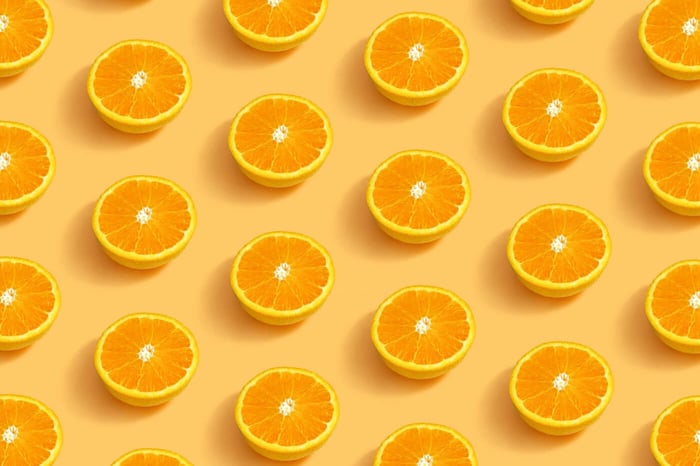
Your hair’s appearance is a direct reflection of how balanced your diet is. Vitamins for hair might help you reach healthier hair now!
Growing and maintaining hair is a complicated process that takes a lot of resources, but it’s also non-essential to your survival. That means that if you don’t eat all the nutrients your body needs, it’ll pull resources from your hair and give them to the more “essential” systems, meaning vitamins for hair is essential for you as well.
Get ahead of yourself by learning about the 7 vitamins and minerals that your hair needs, and make sure your body has plenty of them through a healthy diet and/or supplementation.
7 Best Vitamins for Hair Growth
What are the best vitamins for hair growth then? Let's find out!
Vitamin D
If you’re looking to add extra vitamins for hair into your care routine, the first and most important is vitamin D. The sunshine vitamin plays an important role in the hair follicle, where it stimulates the growth of new hairs. If your vitamin D levels are out of whack, shed hairs may be replaced more slowly, leading to net hair loss.
Unfortunately, most Americans are actually deficient in vitamin D. During your next visit to your primary care doctor, ask them to check your vitamin D levels--a simple test can tell you where you’re at and inform your journey to get more vitamin D.
Get outside: You can produce your own vitamin D through sun exposure; typical wisdom says that 15-30 minutes of sunlight on exposed sun every day will keep you healthy. However, there are caveats to this rule. Deeper skin tones might need to absorb more sunlight for the same level of D production, and the winter sun in northern latitudes is too weak to provide sufficient levels of vitamin D for most people.
In your diet: Vitamin D is fat-soluble, and can be found in many fatty fish, like salmon, anchovies, and tuna, as well as most dairy products. Many foods, like milk and bread, are also fortified with vitamin D.
As a supplement: The FDA recommends that adults intake 800 IU vitamin D each day. Depending on your deficiency status, however, your doctor may recommend that you take up to 5,000 IU per day. But until you see your physician and get a test done, stick to 400-800 IU; Vitamin D is toxic in large quantities.
If you supplement with pills, consider taking your vitamin D with magnesium and a fatty meal to increase D’s absorption into your system. Also, doctors now recommend taking K2 along with D supplements for proper assimilation of the nutrients in the body.
B-complex Vitamins
The B-complex vitamins are essential to whole-body health and metabolism. They specifically benefit your hair, meanwhile, because they improve your circulation. When hair follicles get more blood flow, they produce more hairs that are stronger and healthier.
In your diet: Find B-complex vitamins in whole grains, leafy greens, meat, fish, or almonds.
As a supplement: Most multivitamins contain enough B-complex vitamins to give you the boost you need. Other options include B-complex-specific multivitamins or supplements for individual B vitamins.
Biotin (B7)

Biotin, also known as vitamin B7, deserves its own section! It’s a frequent component in hair-promoting multivitamins and shampoos, and has a big reputation in the vitamins for hair regrowth industry.
Although there is limited research to back up biotin’s role in reversing hair loss, we do know how it improves individual follicle health. Biotin stimulates keratin production (the protein that hair is made of) and improves the structure of each hair, making it stronger.
Biotin deficiency is very rare because it is produced by the gut bacteria. Deficiency is only really seen in individuals with diseases that alter nutrient absorption in the gut, like Crohn’s disease. However, hair loss is a common symptom of biotin deficiency.
In your diet: Biotin can be found in egg yolks, legumes, whole grains, cauliflower, and mushrooms. You can also promote biotin levels in your body by eating foods that support your gut bacteria, such as fermented foods.
As a supplement: Biotin supplementation is typically not needed--in a healthy person, as much as 50% of ingested biotin is excreted from the body without being used. But because biotin is water-soluble and easily removed, there is no harm in a little extra. Take with food to reduce uncomfortable side effects, and consider adding in pre- and probiotics for your gut community too.
Vitamin E
Oxidative stress leads to follicles weakening and dying, causing finer and fewer hairs over time. Vitamin E, which is a strong antioxidant, can protect your hair against free radicals.
A small research trial found that E supplements can slow or reverse hair loss, and vitamin E is a common ingredient in topical hair care products. Vitamin E can also increase blood flow to the scalp, aiding hair growth.
In your diet: Find vitamin E in healthy fats like avocados, olive oil, nuts, and seeds. E’s also present in leafy greens, cruciferous vegetables (broccoli and friends) and butternut squash.
As a supplement: As a fat-soluble vitamin, vitamin E is toxic in large quantities. Stick to the supplement instructions on the bottle.
Iron
If you are experiencing pattern baldness, it might pay to check your iron levels. Although hair loss is not a common symptom of iron deficiency, when the two do coincide it typically looks like the more-frequent pattern baldness. Unlike typical pattern baldness, hair loss caused by iron deficiency can be easily reversed with iron supplements.
One mechanism by which iron might affect hair loss is through ferritin. Ferritin is an iron-based compound that resides in the follicles and supports hair growth. When you’re deficient in ferritin, your body siphons away the hair’s supply to other, more critical parts of the body.
In your diet: Spinach and lean proteins are famous for their iron content, but you can also find large quantities in dried fruits, peas, whole grains, and beans. Dried fruits are a particularly good choice because vitamin C can improve iron absorption in the gut.
As a supplement: Any amount of iron supplementation in a non-deficient person is potentially dangerous. If you suspect that you are iron deficient, visit your primary care physician to test your iron levels. Your doctor will use your results to prescribe a safe dosage.
Zinc

Hair loss is a common symptom of zinc deficiency, and men with male pattern baldness actually have less zinc in their blood. These facts make zinc a very strong mineral candidate for hair loss treatments.
In fact, several studies have found that zinc supplements can help to reverse moderate hair loss.
However, it’s also been reported that too much zinc may also cause hair loss. Pursue balance, and don’t push the limits of the zinc that your body can handle.
In your diet: Zinc can be found in oysters, beef, legumes, spinach, and pumpkin seeds. Try to get your daily zinc in your diet, where it is more bioavailable.
As a supplement: If you do supplement with zinc, be cautious about common side effects like nausea and vomiting. Start with a very small dose, and work your way up--but don’t go beyond what is comfortable for you. Take zinc with quercetin to increase absorption.
Protein + Vitamin A
Your hair is primarily made of keratin, a durable protein. Give your hair the building blocks it needs to grow by eating lots of protein, and keratin specifically.
The digestion process will break down any protein you eat into component amino acids, then the keratinocytes in your hair follicles turns those components into keratin. Vitamin A is crucial in this process, so make sure you’re getting plenty of that as well.
In your diet: Protein can be found in meats, dairy, legumes, and nutritional yeast, to name just a few of the most popular protein sources. Get a mix of different protein types to make sure that you’re stocked up on all the amino acids. Vitamin A, meanwhile, can be found in many fruits and vegetables, and especially in red and orange ones.
As a supplement: Protein powder is easily available and easily mixed into smoothies or shakes. Be sure to follow package guidelines: too much protein too quickly is toxic. Vitamin A supplements are also easy to find, as well as combination A+D+K vitamins, which can help you kill three birds with one stone!
Hair-Supporting Multivitamins
There are many multivitamins on the market designed specifically to stimulate hair growth, and all of them are primarily made up of the vitamins and minerals listed in this article. If you decide to go the multivitamin route, check the ingredients list and make sure you know what everything is in there for. Your head will thank you!




